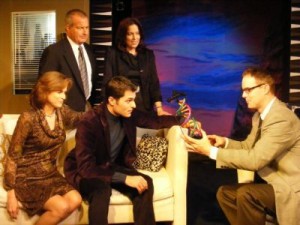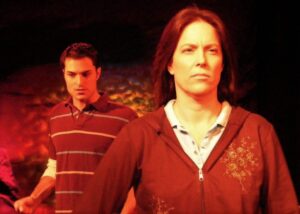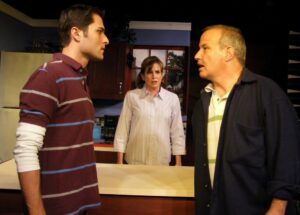
What would you do if a simple test early in pregnancy could determine whether or not your child would be born with a physical defect or a propensity towards a debilitating illness? What if such a test could even tell you what your unborn child’s sexual orientation might be?
 This question is at the heart of Jonathan Tolins’ 1993 drama The Twilight Of The Golds, now being revived in a powerful new staging by The Production Company.
This question is at the heart of Jonathan Tolins’ 1993 drama The Twilight Of The Golds, now being revived in a powerful new staging by The Production Company.
Late-twenties New Yorker David Gold would seem to have it made—a loving partner, a supportive family, and a job as a operatic designer which inspires him. Then, his older married sister Suzanne learns from the latest prenatal testing that the baby which she and husband Rob are expecting has a 90% chance of being “like” her brother. (Curiously, the word gay is never uttered in The Twilight Of The Golds, though the word straight almost is.) You’d think, at least in 2009, that this would not faze her in the least. After all, she loves her younger brother unconditionally and has always been there for him, even going to far as to help David and his high school girlfriend terminate her unplanned pregnancy. (That was back in the days when David was still “experimenting.”)
The Twilight Of The Golds was written in the early 90s, however, several years before protease inhibitors turned HIV into a manageable condition—and at the end of a decade which had seen the gay community ravaged by AIDS. In the play’s first scene, David has come back from yet another funeral. It was a time when every sexually active big city gay man was either dying, burying a lover or friend, or terrified that his next HIV test might turn up positive … a sure death sentence. Gay sex was still illegal in thirteen states and would remain so for the next ten years. This was fifteen years before Prop 8 and the multitude of straight allies who came out in support of equal rights during and after the election battle.
Simply put, in 1993, it was entirely conceivable that a woman like Suzanne Gold-Stein might seriously consider aborting her unborn gay child, to save him from an almost certain life of discrimination, illness, and early death.
Thus, when Suzanne reveals that she is indeed considering terminating her pregnancy, husband and parents are supportive of her right to choose. Not so younger brother David, who sees this as an act of murder, not just of an unborn child who is likely to be gay, but a repudiation of his very identity. “You’re killing me,” he screams out, more than once.
 We know from the beginning pretty much how the story will turn out. In the first of five monologs to the audience (one given by each character), David tells us from the living room of his sister and brother-in-law’s Manhattan apartment: “This is where I saw my family together for the last time.”
We know from the beginning pretty much how the story will turn out. In the first of five monologs to the audience (one given by each character), David tells us from the living room of his sister and brother-in-law’s Manhattan apartment: “This is where I saw my family together for the last time.”
But first there is a “typical” Gold family dinner party and mundane chat about dip made from Lipton Onion Soup mix and sour cream, plastic surgery, and Rob’s annoying habit of calling his mother-in-law “Mom.” Then David arrives (without boyfriend Stephen, not invited to this family-only gathering), bearing a three-year wedding anniversary gift for Suzanne and Rob, a CD boxed set of Richard Wagner’s complete Ring Of The Nieblung, which goes on the shelf beside David’s previous (and still unopened) operatic or musical comedy gifts.
David describes the last scene of Die Walküre, part of Wagner’s Ring Cycle. Wotan, a god “forced into obeying laws that he no longer understands or believes in, must abandon what he loves most of all. In one moment, we see parent and child, god and mortal, parting ways for eternity. And we know that it could be no other way.” For David Gold, the events which are about to unfold also mean parting ways for eternity. By the end of The Twilight Of The Golds, we too know that “it could be no other way.”
When Suzanne announces her pregnancy to the entire family, only Rob is slightly annoyed. Couldn’t she have told him first? But for the most part, there is all-around joy. Then comes the news about the likely sexual orientation of the unborn child and the proverbial “all hell breaks loose.” Walter and Phyllis take a hands-off attitude. This is ultimately Suzanne’s decision. Rob seems to be hoping that she’ll decide to terminate her pregnancy. After all, “Do I want a kid who’s going to know every time he looks in Suzanne’s eyes that he’s not the one she wanted?” Only David is horrified. For his sister to decide to abort her child and for his parents not to side firmly with its right to life (this from someone who’s never before been on the side of the “Right-to-Lifers’”) is proof positive that despite their protestations of love, they’d all have been happier if he’d never been born.
Powerful stuff this, and made even more powerful by TL Kolman’s impeccable direction and by the impressive performances of his quintet of actors.
 Charismatic Eli Kranski makes a striking ProdCo debut as David. His dark good looks and passionate performance would be enough to persuade the audience to take his side were it not for the even-handed way Tolins presents each character’s arguments. Gretchen Koerner follows her fine work in O Jerusalem with a rich, multi-layered performance here as Suzanne. Mark L. Taylor perfectly captures the all-American dad, under whose good nature lies disappointment in the paths both of his children have taken in life. As Phyllis, Penny Peyser is absolutely superb, a Jewish June Cleaver who never thought that she’d have to deal with these kinds of family issues, and the sobs she breaks down into late in the play are devastating. New ProdCo company member Bryan Okes Fuller makes a powerful impression as Rob, who unlike David and Suzanne has actually been rejected by his Orthodox Jewish parents—for choosing genetic research as his field of specialization. (Rob’s father has called him “hateful” and wondered why God has punished them with a “Nazi son.”)
Charismatic Eli Kranski makes a striking ProdCo debut as David. His dark good looks and passionate performance would be enough to persuade the audience to take his side were it not for the even-handed way Tolins presents each character’s arguments. Gretchen Koerner follows her fine work in O Jerusalem with a rich, multi-layered performance here as Suzanne. Mark L. Taylor perfectly captures the all-American dad, under whose good nature lies disappointment in the paths both of his children have taken in life. As Phyllis, Penny Peyser is absolutely superb, a Jewish June Cleaver who never thought that she’d have to deal with these kinds of family issues, and the sobs she breaks down into late in the play are devastating. New ProdCo company member Bryan Okes Fuller makes a powerful impression as Rob, who unlike David and Suzanne has actually been rejected by his Orthodox Jewish parents—for choosing genetic research as his field of specialization. (Rob’s father has called him “hateful” and wondered why God has punished them with a “Nazi son.”)
The entire production design is by ProdCo Artistic Director August Viverito, and it is outstanding. Once again Viverito has maximized the Chandler Studio Theatre’s limited stage area with an inventive living room set which turns into a suburban kitchen at a moment’s notice and incorporates a vivid painted backdrop representing the rocky mountain setting of Wagner’s Götterdämmerung, aka The Twilight of the Gods. Viverito’s lighting is equally striking and his sound design seamlessly integrates Wagnerian operatic themes.
If there is anything to quibble about, it’s the production’s lack of a clear time frame for the action. Tolins decision to “update” the language of his original script to make it more contemporary is a mistake. In 1993 it would have been entirely understandable for these characters to react so strongly to Suzanne’s news. That was, after all, the height of the AIDS epidemic when young gay men were still dying right and left and when the idea of an out TV superstar like Ellen DeGeneres was almost as unimaginable as gay marriage becoming reality. In 2009, the Golds’ reaction almost provokes laughter. Who are these people and what New York City do they live in?
Best to assume that the story is indeed taking place sixteen years ago. As such, it is a powerful, moving, and unsettling look at the complexities of family love and familial relationships.
The Twilight Of The Golds is a play that will not just engross you, but one which will stay on your mind long after the lights have dimmed on the Gold family. Be prepared to spend the drive home talking or simply thinking about what you’ve just seen.
The Production Company, Chandler Studio Theatre, 12443 Chandler Blvd., North Hollywood.
www.theprodco.com
–Steven Stanley
February 6, 2009


 Since 2007, Steven Stanley's StageSceneLA.com has spotlighted the best in Southern California theater via reviews, interviews, and its annual StageSceneLA Scenies.
Since 2007, Steven Stanley's StageSceneLA.com has spotlighted the best in Southern California theater via reviews, interviews, and its annual StageSceneLA Scenies.







 COPYRIGHT 2024 STEVEN STANLEY :: DESIGN BY
COPYRIGHT 2024 STEVEN STANLEY :: DESIGN BY